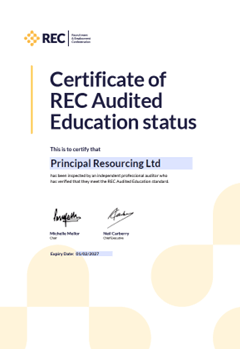It is estimated that there are around 9,000 supply teachers in the UK, compared to over 460,000 full-time teachers in England alone. Supply teachers are a vital part of the ongoing running of any school, but their importance can sometimes go unnoticed. Supply teaching plays an indispensable role within our schools, making sure that learning takes place seamlessly when the unexpected happens.
Many people consider supply teaching jobs a convenient and fulfilling choice for working in education. Principal Resourcing is one of the leading supply agencies in the area and helps hundreds of supply teachers and schools.
What is a Supply Teacher?
Many of us will have had supply teachers during our own time as students, and we could be accused of undervaluing their role. Otherwise known as substitute teachers or relief teachers, supply staff are ready to step into the classroom when needed. Whether they are required in order to cover regular teachers for illness, training or any other support, supply teachers help keep the classroom active.
Because supply teachers are often called upon in emergencies, they need to possess a unique set of skills. They also need to be adaptable and resilient to cope with the school’s needs and are an integral part of the education system.
How can supply teachers help our schools?
It’s fair to say that our schools would struggle to get through the day without supply teachers. As we’ve seen, they are ready to step in to cover absenteeism, training, additional classes and more. The benefits of supply staff in schools cannot be underestimated.
Flexibility
One of the main benefits that supply teachers bring to schools is flexibility. Schools often have to deal with unforeseen circumstances like sudden teacher absences and supply staff are there to plug that gap. Without the facility of stand-in teachers, the education of students would grind to a halt. There is also the additional benefit of giving the students the opportunity to learn about adapting to change.
Staff shortages
Schools often face staff shortages for other reasons aside from illness. Relief teachers play a vital role in keeping schools running and step in when schools need them most. This gives schools the opportunity to efficiently plan their staffing levels and continue the important process of educating children.
Supporting existing staff
The benefits of supply staff impact more than just the student population; they have a positive impact on the other teachers within the school. When regular teaching staff feel supported, it helps them remain focused and ultimately maintain a high level of teaching.

What does it take to become a Supply Teacher?
Many people find that supply teaching fits with their chosen lifestyle rather than taking on permanent teaching roles. So why do people choose to be substitute teachers? The reasons are many, so let’s look at why you might want to consider becoming a supply teacher. Do you have what it takes?
Flexible working
This is one of the main reasons people choose supply teaching over full-time teaching. Being able to choose when you are available to work means you can fit it in around you. Particularly if you have a young family or you’ve taken a break from work, supply teaching gives you the flexibility to manage your hours. Having a flexible work schedule helps maintain a work-life balance that works for you.
Adaptability
People who choose to be supply teachers need the ability to adapt to any given situation. Supply teachers can find themselves working in multiple schools with differing age groups of students. Relief staff need to be able to respond to varied environments.
Different schools have varied processes and structures that a supply teacher will have to get used to and manage. Students of different age groups will have different behaviours and levels of concentration, and substitute teachers need to support that. Over time, a supply teacher may get to know the schools they are working in. However, supply teachers still need to be able to adjust their working style on any given day.
Resilience
In addition to being adaptable, supply teachers need to be resilient. Relief teachers are often required to deal with challenging situations. They may be needed to deal with students with behavioural problems who they don’t already have a relationship with. The class may feel upset by the absence of their usual teacher. These examples can create a potentially hostile environment that the supply teacher needs to manage.
Communication
Supply teachers need first-rate communication skills. Good communication skills are essential for any successful teacher, but a supply teacher needs to communicate with various sites quickly. Substitute teachers need to build a fast rapport with new schools, colleagues, students and supply agencies to maintain a balanced career.
Organisation
Working in multiple and varied schools and environments takes organisation. A successful supply teacher will plan their time and ensure that they have structured lesson plans available. Keep learning materials in order so they are available when you need them. Also, keep in touch with the school and your supply agency to be as prepared as possible.
Principal Resourcing Support Schools with Top Quality Supply Teachers
Many schools rely on the resources of good substitutes or relief staff. Supply teachers are essential in supporting schools, students and fellow teachers. A recent report discovered a drop in the number of supply teachers registered for work in the UK. Principal Resourcing is doing everything we can to help plug that skills gap to avoid gaps in students’ education.
There are over 960,000 children of school age throughout Yorkshire, the Humber and Lincolnshire. We support schools to ensure that they always have enough staff to support those students. If you are looking for supply teaching work, speak to a member of our team today.

